Bachelor of Nursing Case Study Analysis: Ethical, Legal Considerations
VerifiedAdded on 2022/08/21
|10
|2506
|13
Case Study
AI Summary
This assignment presents an analysis of three nursing case studies, each exploring ethical and legal challenges within healthcare settings. The first case involves a child's vaccination, addressing parental consent, the NMBA code of ethics, and relevant Australian legislation like the Child Protection Act. The second case study focuses on a minor diagnosed with a sexually transmitted disease, examining confidentiality, patient autonomy, and legislation such as the Medical Treatment Act. The third case study explores a child exposed to domestic violence, considering non-maleficence, social justice, and relevant acts like the Child Wellbeing and Safety Act. Each case study includes an identification of ethical and legal issues, discussion of relevant legislation, recommended actions for the registered nurse, and strategies for providing holistic, patient and family-centered care, supported by a minimum of ten references. This assignment aims to provide a comprehensive understanding of ethical decision-making, legal compliance, and patient-centered care in nursing practice.
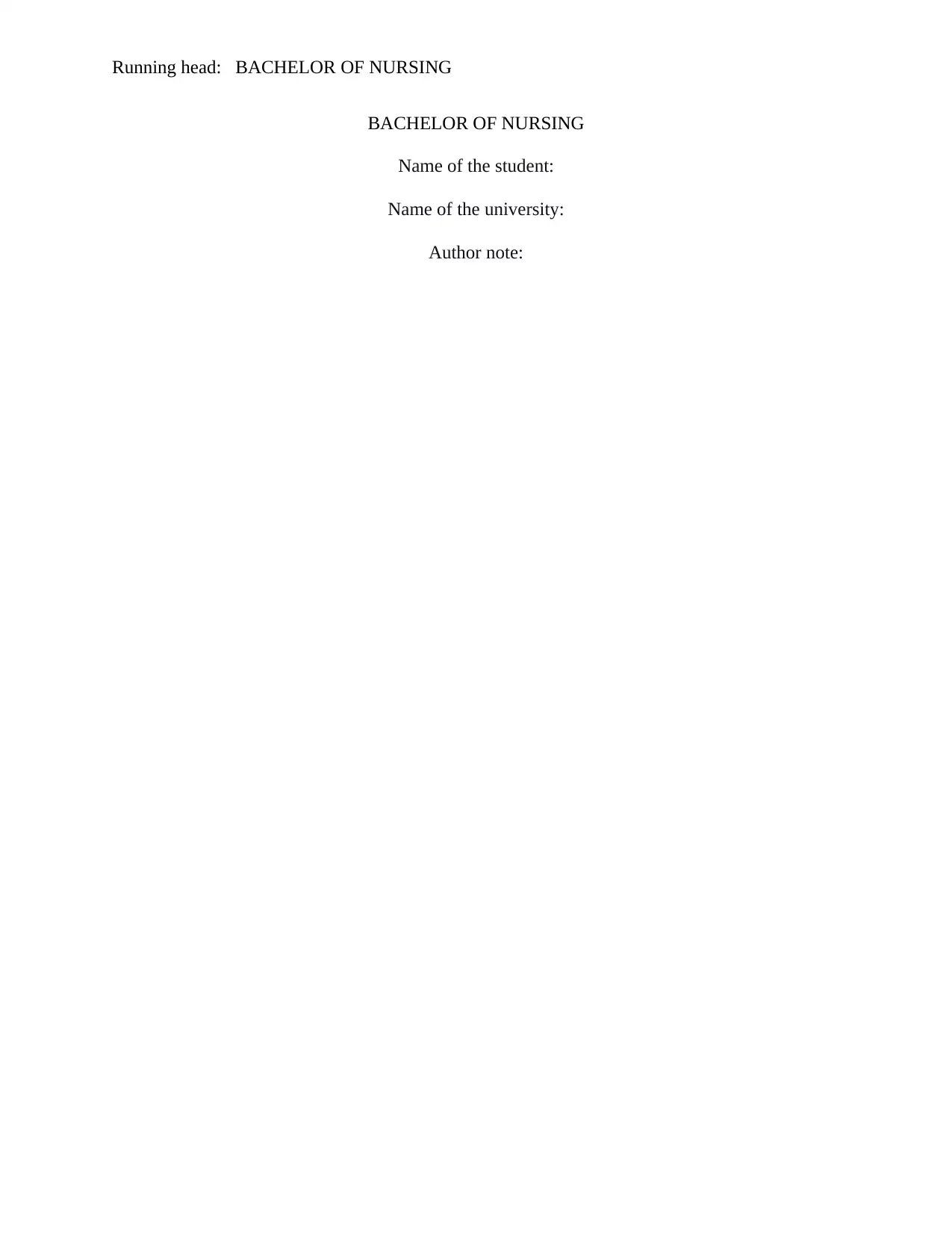
Running head: BACHELOR OF NURSING
BACHELOR OF NURSING
Name of the student:
Name of the university:
Author note:
BACHELOR OF NURSING
Name of the student:
Name of the university:
Author note:
Paraphrase This Document
Need a fresh take? Get an instant paraphrase of this document with our AI Paraphraser
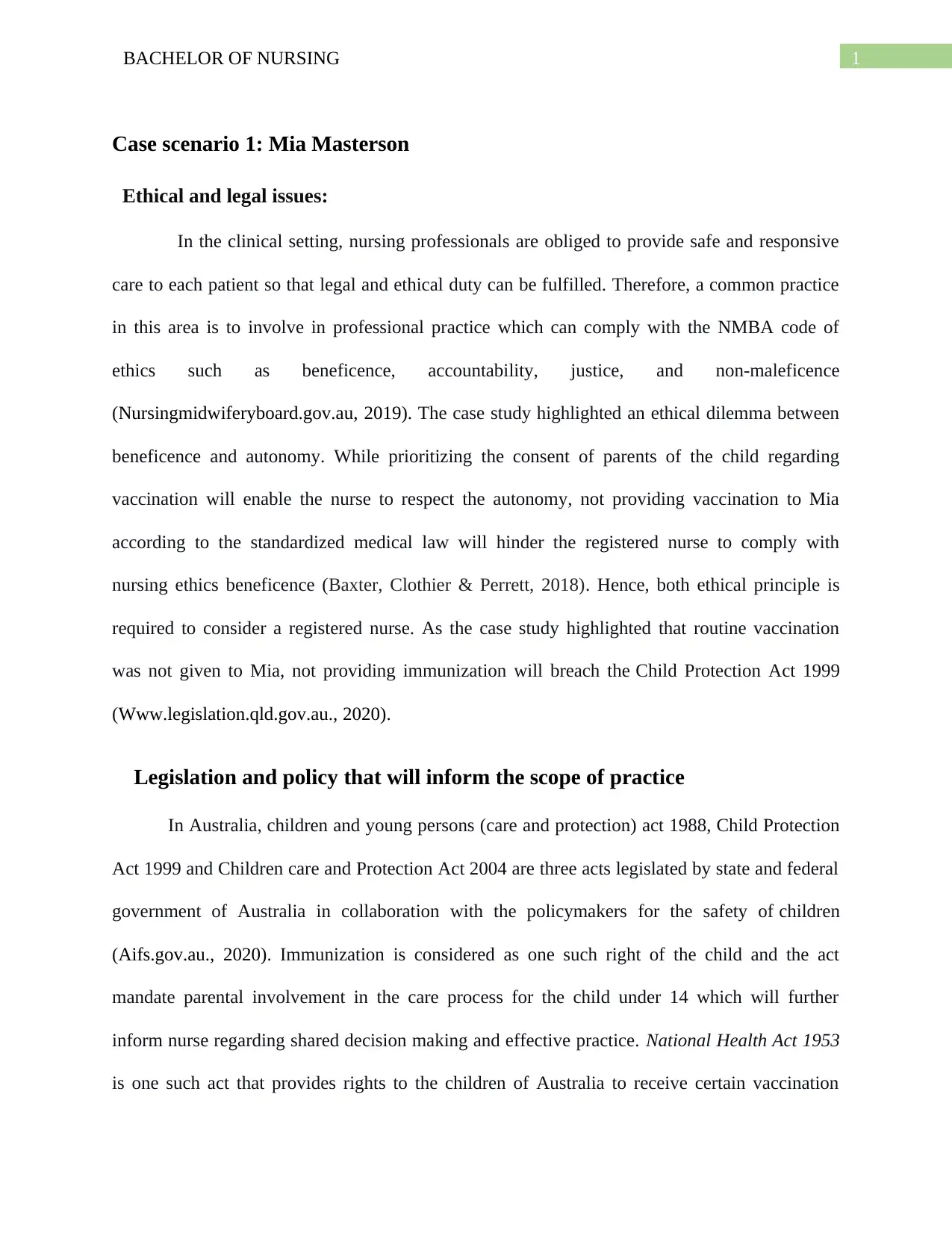
1BACHELOR OF NURSING
Case scenario 1: Mia Masterson
Ethical and legal issues:
In the clinical setting, nursing professionals are obliged to provide safe and responsive
care to each patient so that legal and ethical duty can be fulfilled. Therefore, a common practice
in this area is to involve in professional practice which can comply with the NMBA code of
ethics such as beneficence, accountability, justice, and non-maleficence
(Nursingmidwiferyboard.gov.au, 2019). The case study highlighted an ethical dilemma between
beneficence and autonomy. While prioritizing the consent of parents of the child regarding
vaccination will enable the nurse to respect the autonomy, not providing vaccination to Mia
according to the standardized medical law will hinder the registered nurse to comply with
nursing ethics beneficence (Baxter, Clothier & Perrett, 2018). Hence, both ethical principle is
required to consider a registered nurse. As the case study highlighted that routine vaccination
was not given to Mia, not providing immunization will breach the Child Protection Act 1999
(Www.legislation.qld.gov.au., 2020).
Legislation and policy that will inform the scope of practice
In Australia, children and young persons (care and protection) act 1988, Child Protection
Act 1999 and Children care and Protection Act 2004 are three acts legislated by state and federal
government of Australia in collaboration with the policymakers for the safety of children
(Aifs.gov.au., 2020). Immunization is considered as one such right of the child and the act
mandate parental involvement in the care process for the child under 14 which will further
inform nurse regarding shared decision making and effective practice. National Health Act 1953
is one such act that provides rights to the children of Australia to receive certain vaccination
Case scenario 1: Mia Masterson
Ethical and legal issues:
In the clinical setting, nursing professionals are obliged to provide safe and responsive
care to each patient so that legal and ethical duty can be fulfilled. Therefore, a common practice
in this area is to involve in professional practice which can comply with the NMBA code of
ethics such as beneficence, accountability, justice, and non-maleficence
(Nursingmidwiferyboard.gov.au, 2019). The case study highlighted an ethical dilemma between
beneficence and autonomy. While prioritizing the consent of parents of the child regarding
vaccination will enable the nurse to respect the autonomy, not providing vaccination to Mia
according to the standardized medical law will hinder the registered nurse to comply with
nursing ethics beneficence (Baxter, Clothier & Perrett, 2018). Hence, both ethical principle is
required to consider a registered nurse. As the case study highlighted that routine vaccination
was not given to Mia, not providing immunization will breach the Child Protection Act 1999
(Www.legislation.qld.gov.au., 2020).
Legislation and policy that will inform the scope of practice
In Australia, children and young persons (care and protection) act 1988, Child Protection
Act 1999 and Children care and Protection Act 2004 are three acts legislated by state and federal
government of Australia in collaboration with the policymakers for the safety of children
(Aifs.gov.au., 2020). Immunization is considered as one such right of the child and the act
mandate parental involvement in the care process for the child under 14 which will further
inform nurse regarding shared decision making and effective practice. National Health Act 1953
is one such act that provides rights to the children of Australia to receive certain vaccination
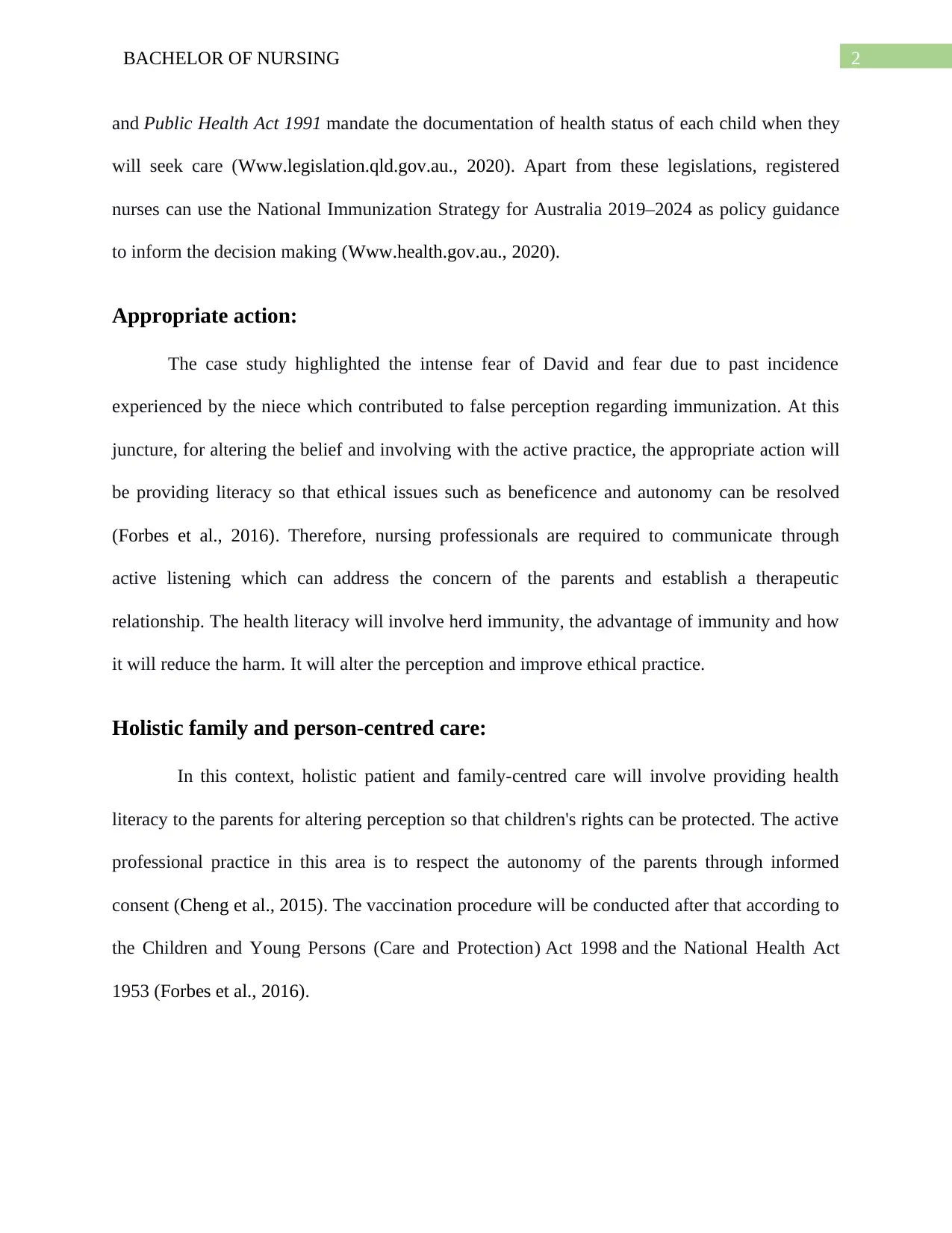
2BACHELOR OF NURSING
and Public Health Act 1991 mandate the documentation of health status of each child when they
will seek care (Www.legislation.qld.gov.au., 2020). Apart from these legislations, registered
nurses can use the National Immunization Strategy for Australia 2019–2024 as policy guidance
to inform the decision making (Www.health.gov.au., 2020).
Appropriate action:
The case study highlighted the intense fear of David and fear due to past incidence
experienced by the niece which contributed to false perception regarding immunization. At this
juncture, for altering the belief and involving with the active practice, the appropriate action will
be providing literacy so that ethical issues such as beneficence and autonomy can be resolved
(Forbes et al., 2016). Therefore, nursing professionals are required to communicate through
active listening which can address the concern of the parents and establish a therapeutic
relationship. The health literacy will involve herd immunity, the advantage of immunity and how
it will reduce the harm. It will alter the perception and improve ethical practice.
Holistic family and person-centred care:
In this context, holistic patient and family-centred care will involve providing health
literacy to the parents for altering perception so that children's rights can be protected. The active
professional practice in this area is to respect the autonomy of the parents through informed
consent (Cheng et al., 2015). The vaccination procedure will be conducted after that according to
the Children and Young Persons (Care and Protection) Act 1998 and the National Health Act
1953 (Forbes et al., 2016).
and Public Health Act 1991 mandate the documentation of health status of each child when they
will seek care (Www.legislation.qld.gov.au., 2020). Apart from these legislations, registered
nurses can use the National Immunization Strategy for Australia 2019–2024 as policy guidance
to inform the decision making (Www.health.gov.au., 2020).
Appropriate action:
The case study highlighted the intense fear of David and fear due to past incidence
experienced by the niece which contributed to false perception regarding immunization. At this
juncture, for altering the belief and involving with the active practice, the appropriate action will
be providing literacy so that ethical issues such as beneficence and autonomy can be resolved
(Forbes et al., 2016). Therefore, nursing professionals are required to communicate through
active listening which can address the concern of the parents and establish a therapeutic
relationship. The health literacy will involve herd immunity, the advantage of immunity and how
it will reduce the harm. It will alter the perception and improve ethical practice.
Holistic family and person-centred care:
In this context, holistic patient and family-centred care will involve providing health
literacy to the parents for altering perception so that children's rights can be protected. The active
professional practice in this area is to respect the autonomy of the parents through informed
consent (Cheng et al., 2015). The vaccination procedure will be conducted after that according to
the Children and Young Persons (Care and Protection) Act 1998 and the National Health Act
1953 (Forbes et al., 2016).
⊘ This is a preview!⊘
Do you want full access?
Subscribe today to unlock all pages.

Trusted by 1+ million students worldwide
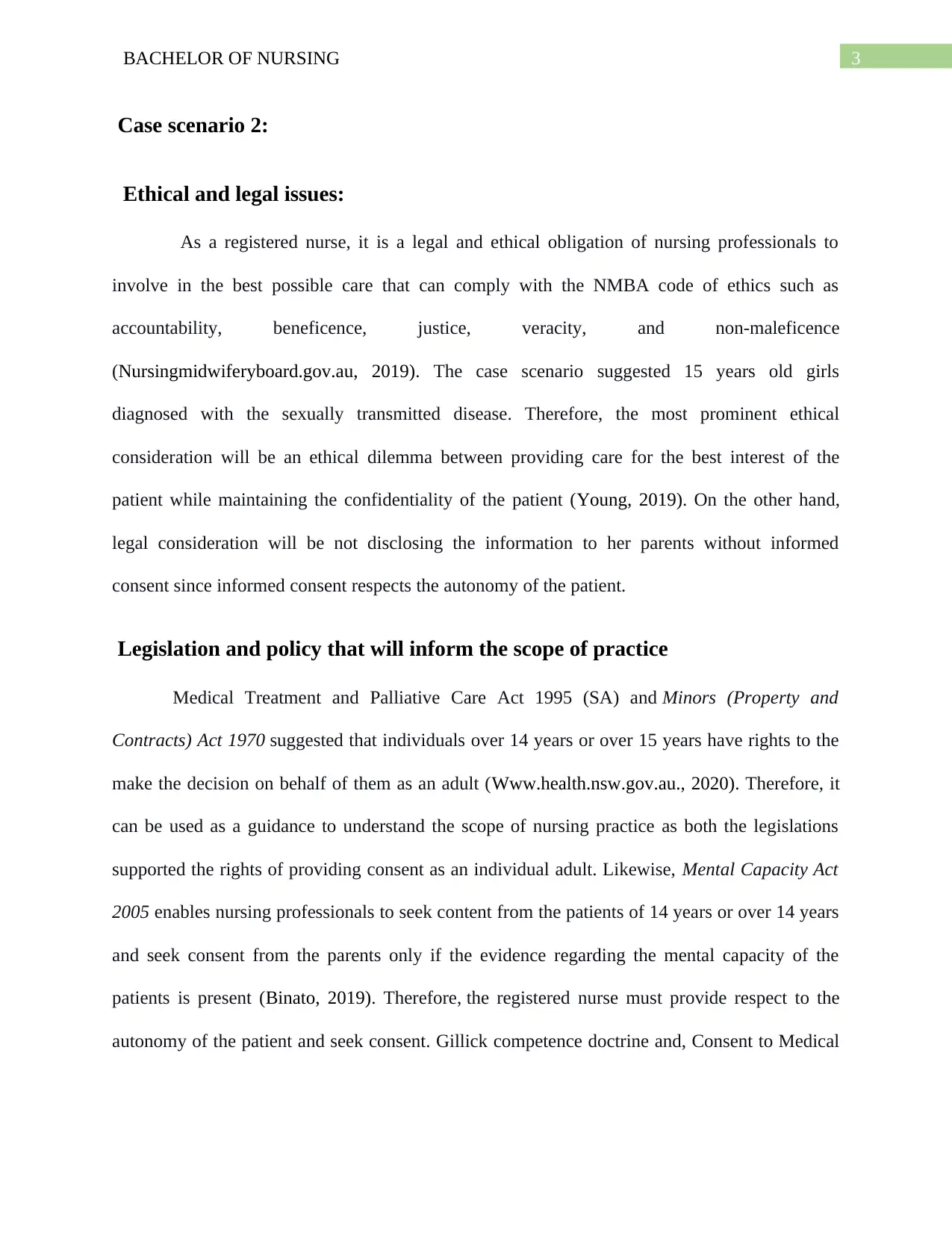
3BACHELOR OF NURSING
Case scenario 2:
Ethical and legal issues:
As a registered nurse, it is a legal and ethical obligation of nursing professionals to
involve in the best possible care that can comply with the NMBA code of ethics such as
accountability, beneficence, justice, veracity, and non-maleficence
(Nursingmidwiferyboard.gov.au, 2019). The case scenario suggested 15 years old girls
diagnosed with the sexually transmitted disease. Therefore, the most prominent ethical
consideration will be an ethical dilemma between providing care for the best interest of the
patient while maintaining the confidentiality of the patient (Young, 2019). On the other hand,
legal consideration will be not disclosing the information to her parents without informed
consent since informed consent respects the autonomy of the patient.
Legislation and policy that will inform the scope of practice
Medical Treatment and Palliative Care Act 1995 (SA) and Minors (Property and
Contracts) Act 1970 suggested that individuals over 14 years or over 15 years have rights to the
make the decision on behalf of them as an adult (Www.health.nsw.gov.au., 2020). Therefore, it
can be used as a guidance to understand the scope of nursing practice as both the legislations
supported the rights of providing consent as an individual adult. Likewise, Mental Capacity Act
2005 enables nursing professionals to seek content from the patients of 14 years or over 14 years
and seek consent from the parents only if the evidence regarding the mental capacity of the
patients is present (Binato, 2019). Therefore, the registered nurse must provide respect to the
autonomy of the patient and seek consent. Gillick competence doctrine and, Consent to Medical
Case scenario 2:
Ethical and legal issues:
As a registered nurse, it is a legal and ethical obligation of nursing professionals to
involve in the best possible care that can comply with the NMBA code of ethics such as
accountability, beneficence, justice, veracity, and non-maleficence
(Nursingmidwiferyboard.gov.au, 2019). The case scenario suggested 15 years old girls
diagnosed with the sexually transmitted disease. Therefore, the most prominent ethical
consideration will be an ethical dilemma between providing care for the best interest of the
patient while maintaining the confidentiality of the patient (Young, 2019). On the other hand,
legal consideration will be not disclosing the information to her parents without informed
consent since informed consent respects the autonomy of the patient.
Legislation and policy that will inform the scope of practice
Medical Treatment and Palliative Care Act 1995 (SA) and Minors (Property and
Contracts) Act 1970 suggested that individuals over 14 years or over 15 years have rights to the
make the decision on behalf of them as an adult (Www.health.nsw.gov.au., 2020). Therefore, it
can be used as a guidance to understand the scope of nursing practice as both the legislations
supported the rights of providing consent as an individual adult. Likewise, Mental Capacity Act
2005 enables nursing professionals to seek content from the patients of 14 years or over 14 years
and seek consent from the parents only if the evidence regarding the mental capacity of the
patients is present (Binato, 2019). Therefore, the registered nurse must provide respect to the
autonomy of the patient and seek consent. Gillick competence doctrine and, Consent to Medical
Paraphrase This Document
Need a fresh take? Get an instant paraphrase of this document with our AI Paraphraser
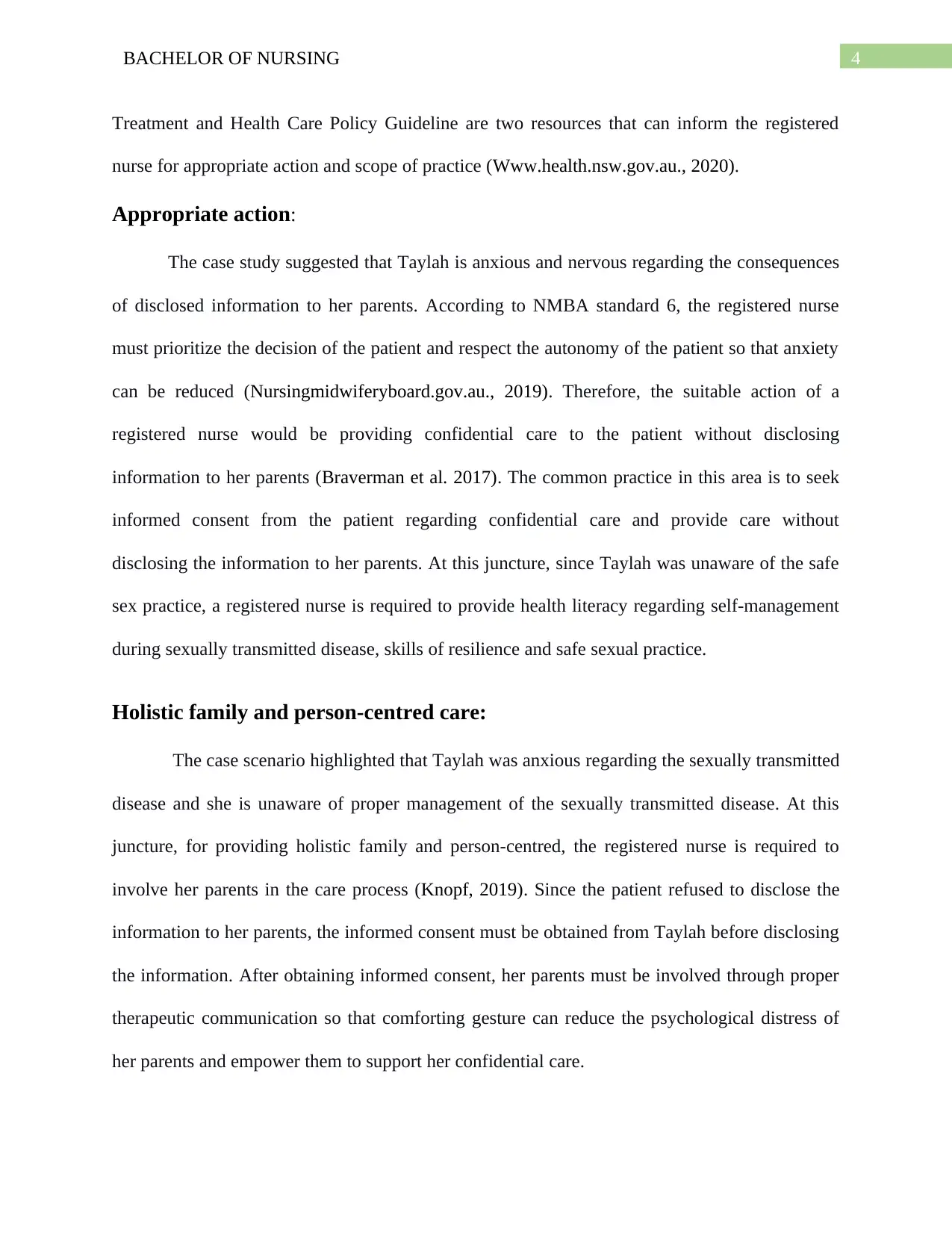
4BACHELOR OF NURSING
Treatment and Health Care Policy Guideline are two resources that can inform the registered
nurse for appropriate action and scope of practice (Www.health.nsw.gov.au., 2020).
Appropriate action:
The case study suggested that Taylah is anxious and nervous regarding the consequences
of disclosed information to her parents. According to NMBA standard 6, the registered nurse
must prioritize the decision of the patient and respect the autonomy of the patient so that anxiety
can be reduced (Nursingmidwiferyboard.gov.au., 2019). Therefore, the suitable action of a
registered nurse would be providing confidential care to the patient without disclosing
information to her parents (Braverman et al. 2017). The common practice in this area is to seek
informed consent from the patient regarding confidential care and provide care without
disclosing the information to her parents. At this juncture, since Taylah was unaware of the safe
sex practice, a registered nurse is required to provide health literacy regarding self-management
during sexually transmitted disease, skills of resilience and safe sexual practice.
Holistic family and person-centred care:
The case scenario highlighted that Taylah was anxious regarding the sexually transmitted
disease and she is unaware of proper management of the sexually transmitted disease. At this
juncture, for providing holistic family and person-centred, the registered nurse is required to
involve her parents in the care process (Knopf, 2019). Since the patient refused to disclose the
information to her parents, the informed consent must be obtained from Taylah before disclosing
the information. After obtaining informed consent, her parents must be involved through proper
therapeutic communication so that comforting gesture can reduce the psychological distress of
her parents and empower them to support her confidential care.
Treatment and Health Care Policy Guideline are two resources that can inform the registered
nurse for appropriate action and scope of practice (Www.health.nsw.gov.au., 2020).
Appropriate action:
The case study suggested that Taylah is anxious and nervous regarding the consequences
of disclosed information to her parents. According to NMBA standard 6, the registered nurse
must prioritize the decision of the patient and respect the autonomy of the patient so that anxiety
can be reduced (Nursingmidwiferyboard.gov.au., 2019). Therefore, the suitable action of a
registered nurse would be providing confidential care to the patient without disclosing
information to her parents (Braverman et al. 2017). The common practice in this area is to seek
informed consent from the patient regarding confidential care and provide care without
disclosing the information to her parents. At this juncture, since Taylah was unaware of the safe
sex practice, a registered nurse is required to provide health literacy regarding self-management
during sexually transmitted disease, skills of resilience and safe sexual practice.
Holistic family and person-centred care:
The case scenario highlighted that Taylah was anxious regarding the sexually transmitted
disease and she is unaware of proper management of the sexually transmitted disease. At this
juncture, for providing holistic family and person-centred, the registered nurse is required to
involve her parents in the care process (Knopf, 2019). Since the patient refused to disclose the
information to her parents, the informed consent must be obtained from Taylah before disclosing
the information. After obtaining informed consent, her parents must be involved through proper
therapeutic communication so that comforting gesture can reduce the psychological distress of
her parents and empower them to support her confidential care.
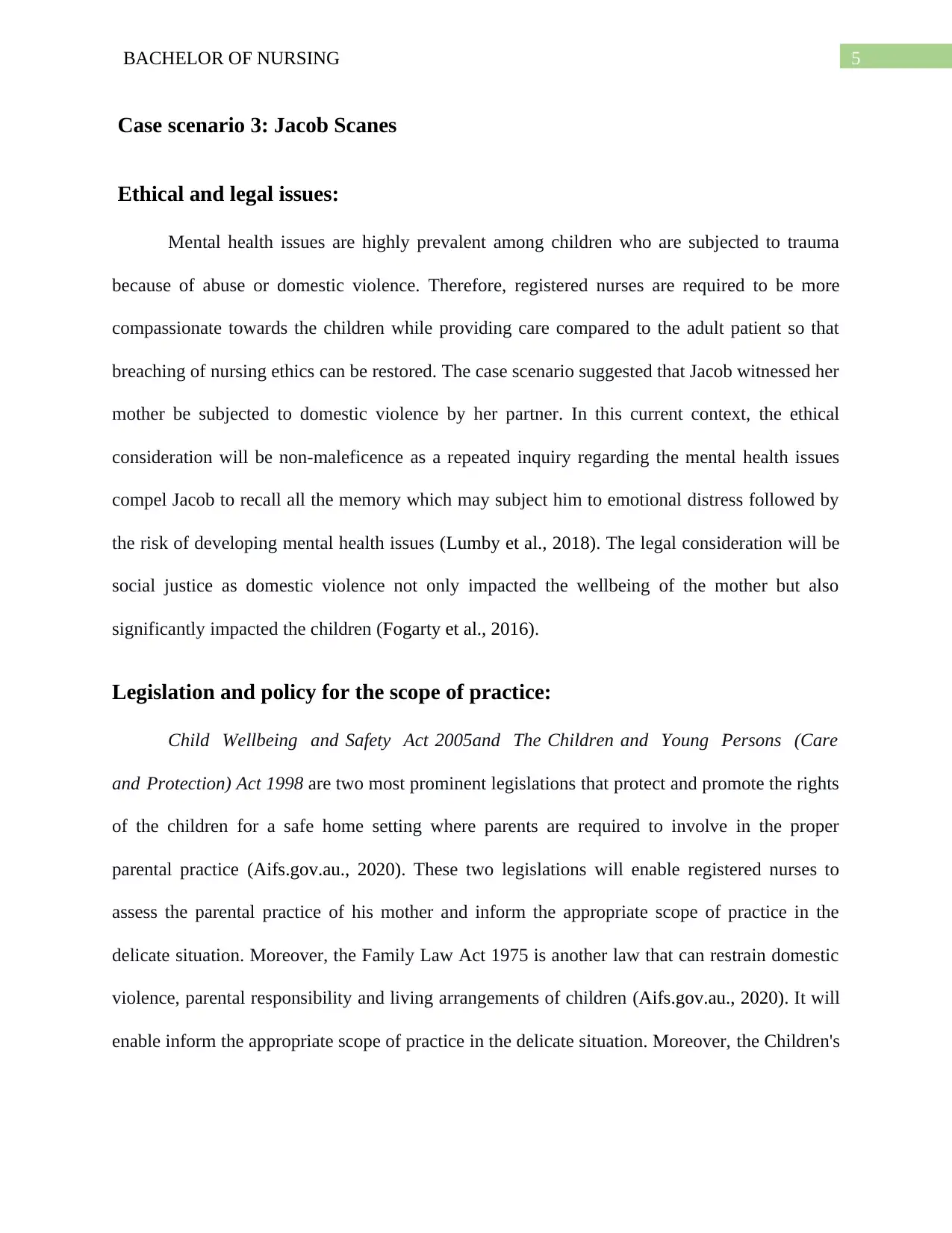
5BACHELOR OF NURSING
Case scenario 3: Jacob Scanes
Ethical and legal issues:
Mental health issues are highly prevalent among children who are subjected to trauma
because of abuse or domestic violence. Therefore, registered nurses are required to be more
compassionate towards the children while providing care compared to the adult patient so that
breaching of nursing ethics can be restored. The case scenario suggested that Jacob witnessed her
mother be subjected to domestic violence by her partner. In this current context, the ethical
consideration will be non-maleficence as a repeated inquiry regarding the mental health issues
compel Jacob to recall all the memory which may subject him to emotional distress followed by
the risk of developing mental health issues (Lumby et al., 2018). The legal consideration will be
social justice as domestic violence not only impacted the wellbeing of the mother but also
significantly impacted the children (Fogarty et al., 2016).
Legislation and policy for the scope of practice:
Child Wellbeing and Safety Act 2005and The Children and Young Persons (Care
and Protection) Act 1998 are two most prominent legislations that protect and promote the rights
of the children for a safe home setting where parents are required to involve in the proper
parental practice (Aifs.gov.au., 2020). These two legislations will enable registered nurses to
assess the parental practice of his mother and inform the appropriate scope of practice in the
delicate situation. Moreover, the Family Law Act 1975 is another law that can restrain domestic
violence, parental responsibility and living arrangements of children (Aifs.gov.au., 2020). It will
enable inform the appropriate scope of practice in the delicate situation. Moreover, the Children's
Case scenario 3: Jacob Scanes
Ethical and legal issues:
Mental health issues are highly prevalent among children who are subjected to trauma
because of abuse or domestic violence. Therefore, registered nurses are required to be more
compassionate towards the children while providing care compared to the adult patient so that
breaching of nursing ethics can be restored. The case scenario suggested that Jacob witnessed her
mother be subjected to domestic violence by her partner. In this current context, the ethical
consideration will be non-maleficence as a repeated inquiry regarding the mental health issues
compel Jacob to recall all the memory which may subject him to emotional distress followed by
the risk of developing mental health issues (Lumby et al., 2018). The legal consideration will be
social justice as domestic violence not only impacted the wellbeing of the mother but also
significantly impacted the children (Fogarty et al., 2016).
Legislation and policy for the scope of practice:
Child Wellbeing and Safety Act 2005and The Children and Young Persons (Care
and Protection) Act 1998 are two most prominent legislations that protect and promote the rights
of the children for a safe home setting where parents are required to involve in the proper
parental practice (Aifs.gov.au., 2020). These two legislations will enable registered nurses to
assess the parental practice of his mother and inform the appropriate scope of practice in the
delicate situation. Moreover, the Family Law Act 1975 is another law that can restrain domestic
violence, parental responsibility and living arrangements of children (Aifs.gov.au., 2020). It will
enable inform the appropriate scope of practice in the delicate situation. Moreover, the Children's
⊘ This is a preview!⊘
Do you want full access?
Subscribe today to unlock all pages.

Trusted by 1+ million students worldwide
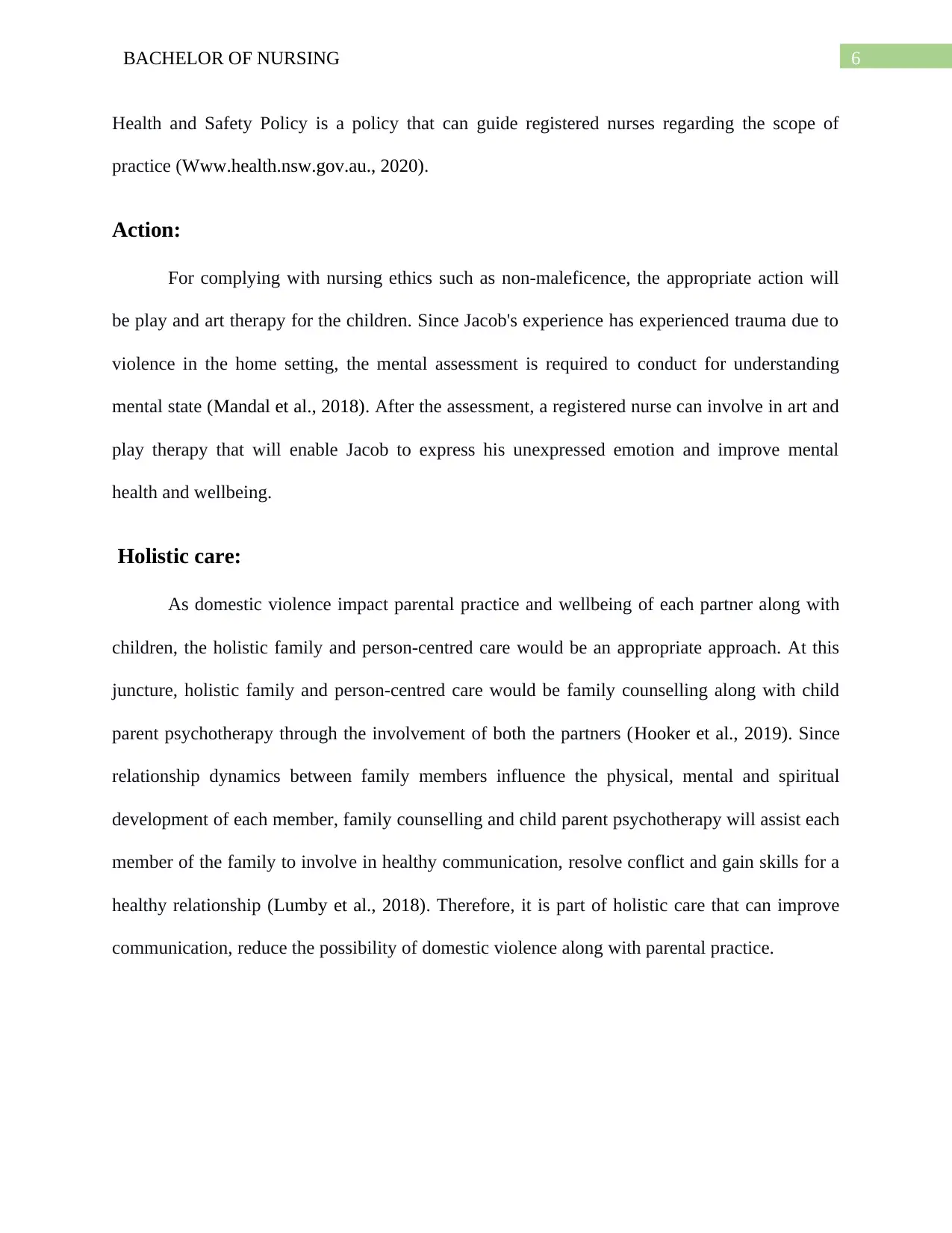
6BACHELOR OF NURSING
Health and Safety Policy is a policy that can guide registered nurses regarding the scope of
practice (Www.health.nsw.gov.au., 2020).
Action:
For complying with nursing ethics such as non-maleficence, the appropriate action will
be play and art therapy for the children. Since Jacob's experience has experienced trauma due to
violence in the home setting, the mental assessment is required to conduct for understanding
mental state (Mandal et al., 2018). After the assessment, a registered nurse can involve in art and
play therapy that will enable Jacob to express his unexpressed emotion and improve mental
health and wellbeing.
Holistic care:
As domestic violence impact parental practice and wellbeing of each partner along with
children, the holistic family and person-centred care would be an appropriate approach. At this
juncture, holistic family and person-centred care would be family counselling along with child
parent psychotherapy through the involvement of both the partners (Hooker et al., 2019). Since
relationship dynamics between family members influence the physical, mental and spiritual
development of each member, family counselling and child parent psychotherapy will assist each
member of the family to involve in healthy communication, resolve conflict and gain skills for a
healthy relationship (Lumby et al., 2018). Therefore, it is part of holistic care that can improve
communication, reduce the possibility of domestic violence along with parental practice.
Health and Safety Policy is a policy that can guide registered nurses regarding the scope of
practice (Www.health.nsw.gov.au., 2020).
Action:
For complying with nursing ethics such as non-maleficence, the appropriate action will
be play and art therapy for the children. Since Jacob's experience has experienced trauma due to
violence in the home setting, the mental assessment is required to conduct for understanding
mental state (Mandal et al., 2018). After the assessment, a registered nurse can involve in art and
play therapy that will enable Jacob to express his unexpressed emotion and improve mental
health and wellbeing.
Holistic care:
As domestic violence impact parental practice and wellbeing of each partner along with
children, the holistic family and person-centred care would be an appropriate approach. At this
juncture, holistic family and person-centred care would be family counselling along with child
parent psychotherapy through the involvement of both the partners (Hooker et al., 2019). Since
relationship dynamics between family members influence the physical, mental and spiritual
development of each member, family counselling and child parent psychotherapy will assist each
member of the family to involve in healthy communication, resolve conflict and gain skills for a
healthy relationship (Lumby et al., 2018). Therefore, it is part of holistic care that can improve
communication, reduce the possibility of domestic violence along with parental practice.
Paraphrase This Document
Need a fresh take? Get an instant paraphrase of this document with our AI Paraphraser
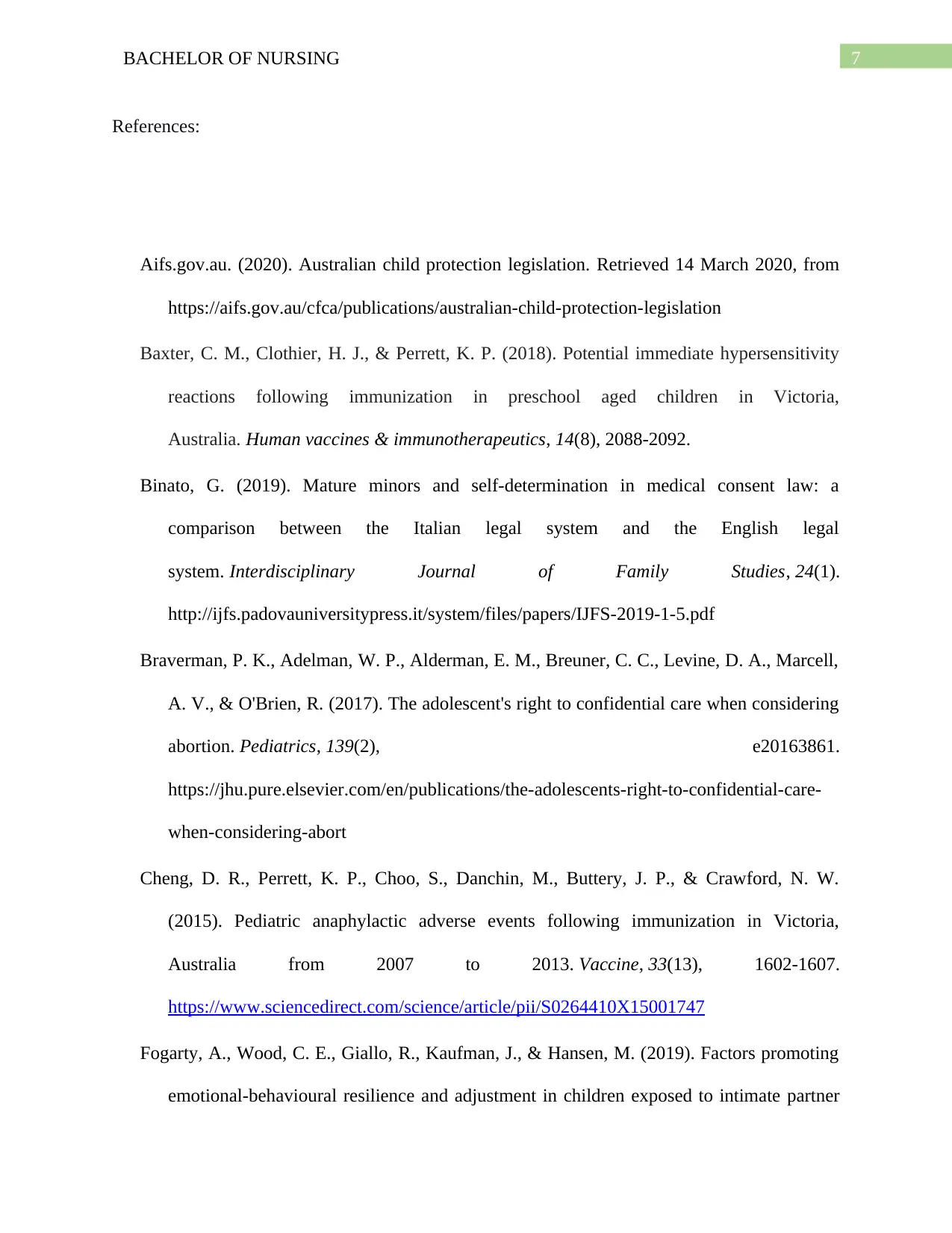
7BACHELOR OF NURSING
References:
Aifs.gov.au. (2020). Australian child protection legislation. Retrieved 14 March 2020, from
https://aifs.gov.au/cfca/publications/australian-child-protection-legislation
Baxter, C. M., Clothier, H. J., & Perrett, K. P. (2018). Potential immediate hypersensitivity
reactions following immunization in preschool aged children in Victoria,
Australia. Human vaccines & immunotherapeutics, 14(8), 2088-2092.
Binato, G. (2019). Mature minors and self-determination in medical consent law: a
comparison between the Italian legal system and the English legal
system. Interdisciplinary Journal of Family Studies, 24(1).
http://ijfs.padovauniversitypress.it/system/files/papers/IJFS-2019-1-5.pdf
Braverman, P. K., Adelman, W. P., Alderman, E. M., Breuner, C. C., Levine, D. A., Marcell,
A. V., & O'Brien, R. (2017). The adolescent's right to confidential care when considering
abortion. Pediatrics, 139(2), e20163861.
https://jhu.pure.elsevier.com/en/publications/the-adolescents-right-to-confidential-care-
when-considering-abort
Cheng, D. R., Perrett, K. P., Choo, S., Danchin, M., Buttery, J. P., & Crawford, N. W.
(2015). Pediatric anaphylactic adverse events following immunization in Victoria,
Australia from 2007 to 2013. Vaccine, 33(13), 1602-1607.
https://www.sciencedirect.com/science/article/pii/S0264410X15001747
Fogarty, A., Wood, C. E., Giallo, R., Kaufman, J., & Hansen, M. (2019). Factors promoting
emotional‐behavioural resilience and adjustment in children exposed to intimate partner
References:
Aifs.gov.au. (2020). Australian child protection legislation. Retrieved 14 March 2020, from
https://aifs.gov.au/cfca/publications/australian-child-protection-legislation
Baxter, C. M., Clothier, H. J., & Perrett, K. P. (2018). Potential immediate hypersensitivity
reactions following immunization in preschool aged children in Victoria,
Australia. Human vaccines & immunotherapeutics, 14(8), 2088-2092.
Binato, G. (2019). Mature minors and self-determination in medical consent law: a
comparison between the Italian legal system and the English legal
system. Interdisciplinary Journal of Family Studies, 24(1).
http://ijfs.padovauniversitypress.it/system/files/papers/IJFS-2019-1-5.pdf
Braverman, P. K., Adelman, W. P., Alderman, E. M., Breuner, C. C., Levine, D. A., Marcell,
A. V., & O'Brien, R. (2017). The adolescent's right to confidential care when considering
abortion. Pediatrics, 139(2), e20163861.
https://jhu.pure.elsevier.com/en/publications/the-adolescents-right-to-confidential-care-
when-considering-abort
Cheng, D. R., Perrett, K. P., Choo, S., Danchin, M., Buttery, J. P., & Crawford, N. W.
(2015). Pediatric anaphylactic adverse events following immunization in Victoria,
Australia from 2007 to 2013. Vaccine, 33(13), 1602-1607.
https://www.sciencedirect.com/science/article/pii/S0264410X15001747
Fogarty, A., Wood, C. E., Giallo, R., Kaufman, J., & Hansen, M. (2019). Factors promoting
emotional‐behavioural resilience and adjustment in children exposed to intimate partner
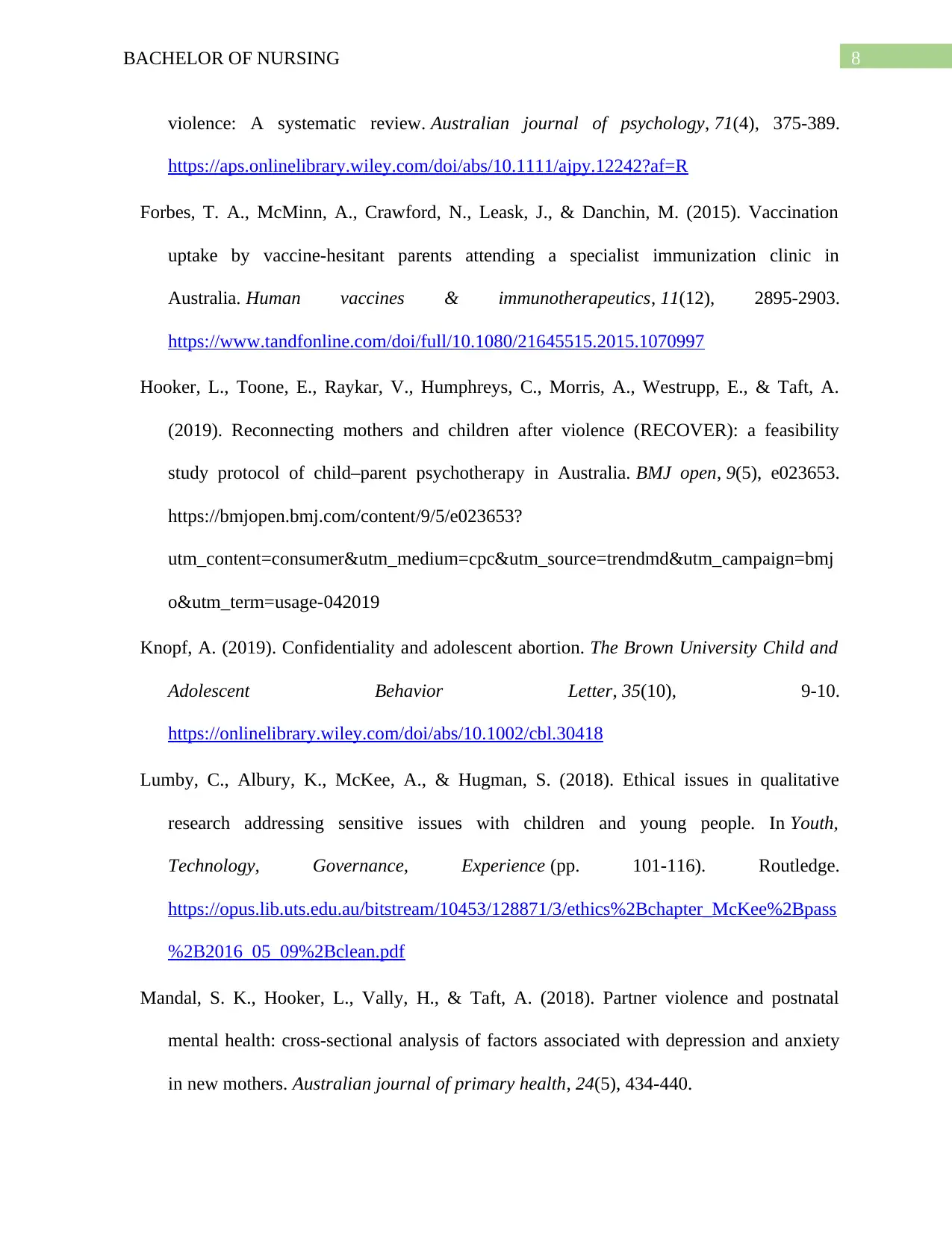
8BACHELOR OF NURSING
violence: A systematic review. Australian journal of psychology, 71(4), 375-389.
https://aps.onlinelibrary.wiley.com/doi/abs/10.1111/ajpy.12242?af=R
Forbes, T. A., McMinn, A., Crawford, N., Leask, J., & Danchin, M. (2015). Vaccination
uptake by vaccine-hesitant parents attending a specialist immunization clinic in
Australia. Human vaccines & immunotherapeutics, 11(12), 2895-2903.
https://www.tandfonline.com/doi/full/10.1080/21645515.2015.1070997
Hooker, L., Toone, E., Raykar, V., Humphreys, C., Morris, A., Westrupp, E., & Taft, A.
(2019). Reconnecting mothers and children after violence (RECOVER): a feasibility
study protocol of child–parent psychotherapy in Australia. BMJ open, 9(5), e023653.
https://bmjopen.bmj.com/content/9/5/e023653?
utm_content=consumer&utm_medium=cpc&utm_source=trendmd&utm_campaign=bmj
o&utm_term=usage-042019
Knopf, A. (2019). Confidentiality and adolescent abortion. The Brown University Child and
Adolescent Behavior Letter, 35(10), 9-10.
https://onlinelibrary.wiley.com/doi/abs/10.1002/cbl.30418
Lumby, C., Albury, K., McKee, A., & Hugman, S. (2018). Ethical issues in qualitative
research addressing sensitive issues with children and young people. In Youth,
Technology, Governance, Experience (pp. 101-116). Routledge.
https://opus.lib.uts.edu.au/bitstream/10453/128871/3/ethics%2Bchapter_McKee%2Bpass
%2B2016_05_09%2Bclean.pdf
Mandal, S. K., Hooker, L., Vally, H., & Taft, A. (2018). Partner violence and postnatal
mental health: cross-sectional analysis of factors associated with depression and anxiety
in new mothers. Australian journal of primary health, 24(5), 434-440.
violence: A systematic review. Australian journal of psychology, 71(4), 375-389.
https://aps.onlinelibrary.wiley.com/doi/abs/10.1111/ajpy.12242?af=R
Forbes, T. A., McMinn, A., Crawford, N., Leask, J., & Danchin, M. (2015). Vaccination
uptake by vaccine-hesitant parents attending a specialist immunization clinic in
Australia. Human vaccines & immunotherapeutics, 11(12), 2895-2903.
https://www.tandfonline.com/doi/full/10.1080/21645515.2015.1070997
Hooker, L., Toone, E., Raykar, V., Humphreys, C., Morris, A., Westrupp, E., & Taft, A.
(2019). Reconnecting mothers and children after violence (RECOVER): a feasibility
study protocol of child–parent psychotherapy in Australia. BMJ open, 9(5), e023653.
https://bmjopen.bmj.com/content/9/5/e023653?
utm_content=consumer&utm_medium=cpc&utm_source=trendmd&utm_campaign=bmj
o&utm_term=usage-042019
Knopf, A. (2019). Confidentiality and adolescent abortion. The Brown University Child and
Adolescent Behavior Letter, 35(10), 9-10.
https://onlinelibrary.wiley.com/doi/abs/10.1002/cbl.30418
Lumby, C., Albury, K., McKee, A., & Hugman, S. (2018). Ethical issues in qualitative
research addressing sensitive issues with children and young people. In Youth,
Technology, Governance, Experience (pp. 101-116). Routledge.
https://opus.lib.uts.edu.au/bitstream/10453/128871/3/ethics%2Bchapter_McKee%2Bpass
%2B2016_05_09%2Bclean.pdf
Mandal, S. K., Hooker, L., Vally, H., & Taft, A. (2018). Partner violence and postnatal
mental health: cross-sectional analysis of factors associated with depression and anxiety
in new mothers. Australian journal of primary health, 24(5), 434-440.
⊘ This is a preview!⊘
Do you want full access?
Subscribe today to unlock all pages.

Trusted by 1+ million students worldwide
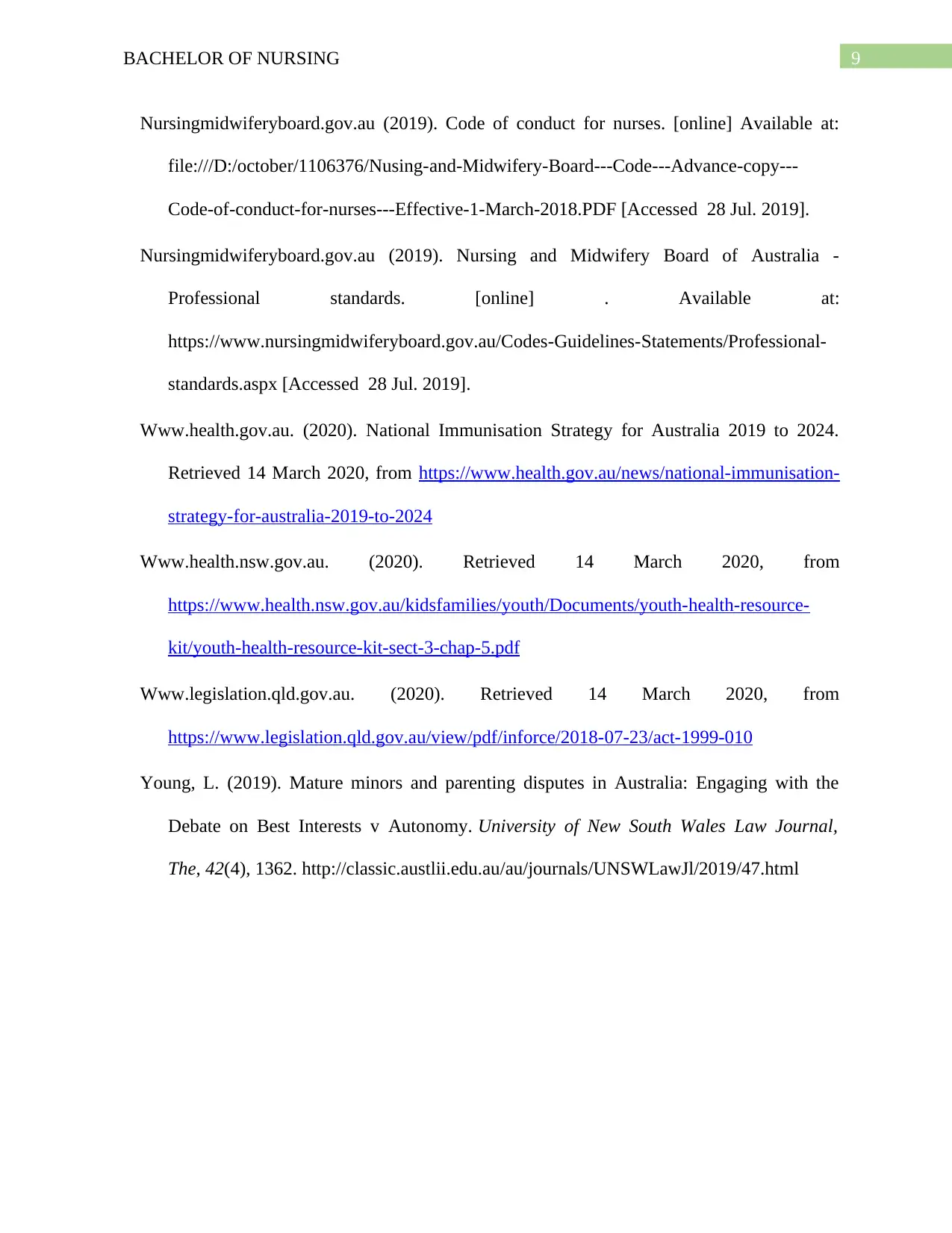
9BACHELOR OF NURSING
Nursingmidwiferyboard.gov.au (2019). Code of conduct for nurses. [online] Available at:
file:///D:/october/1106376/Nusing-and-Midwifery-Board---Code---Advance-copy---
Code-of-conduct-for-nurses---Effective-1-March-2018.PDF [Accessed 28 Jul. 2019].
Nursingmidwiferyboard.gov.au (2019). Nursing and Midwifery Board of Australia -
Professional standards. [online] . Available at:
https://www.nursingmidwiferyboard.gov.au/Codes-Guidelines-Statements/Professional-
standards.aspx [Accessed 28 Jul. 2019].
Www.health.gov.au. (2020). National Immunisation Strategy for Australia 2019 to 2024.
Retrieved 14 March 2020, from https://www.health.gov.au/news/national-immunisation-
strategy-for-australia-2019-to-2024
Www.health.nsw.gov.au. (2020). Retrieved 14 March 2020, from
https://www.health.nsw.gov.au/kidsfamilies/youth/Documents/youth-health-resource-
kit/youth-health-resource-kit-sect-3-chap-5.pdf
Www.legislation.qld.gov.au. (2020). Retrieved 14 March 2020, from
https://www.legislation.qld.gov.au/view/pdf/inforce/2018-07-23/act-1999-010
Young, L. (2019). Mature minors and parenting disputes in Australia: Engaging with the
Debate on Best Interests v Autonomy. University of New South Wales Law Journal,
The, 42(4), 1362. http://classic.austlii.edu.au/au/journals/UNSWLawJl/2019/47.html
Nursingmidwiferyboard.gov.au (2019). Code of conduct for nurses. [online] Available at:
file:///D:/october/1106376/Nusing-and-Midwifery-Board---Code---Advance-copy---
Code-of-conduct-for-nurses---Effective-1-March-2018.PDF [Accessed 28 Jul. 2019].
Nursingmidwiferyboard.gov.au (2019). Nursing and Midwifery Board of Australia -
Professional standards. [online] . Available at:
https://www.nursingmidwiferyboard.gov.au/Codes-Guidelines-Statements/Professional-
standards.aspx [Accessed 28 Jul. 2019].
Www.health.gov.au. (2020). National Immunisation Strategy for Australia 2019 to 2024.
Retrieved 14 March 2020, from https://www.health.gov.au/news/national-immunisation-
strategy-for-australia-2019-to-2024
Www.health.nsw.gov.au. (2020). Retrieved 14 March 2020, from
https://www.health.nsw.gov.au/kidsfamilies/youth/Documents/youth-health-resource-
kit/youth-health-resource-kit-sect-3-chap-5.pdf
Www.legislation.qld.gov.au. (2020). Retrieved 14 March 2020, from
https://www.legislation.qld.gov.au/view/pdf/inforce/2018-07-23/act-1999-010
Young, L. (2019). Mature minors and parenting disputes in Australia: Engaging with the
Debate on Best Interests v Autonomy. University of New South Wales Law Journal,
The, 42(4), 1362. http://classic.austlii.edu.au/au/journals/UNSWLawJl/2019/47.html
1 out of 10
Related Documents
Your All-in-One AI-Powered Toolkit for Academic Success.
+13062052269
info@desklib.com
Available 24*7 on WhatsApp / Email
![[object Object]](/_next/static/media/star-bottom.7253800d.svg)
Unlock your academic potential
Copyright © 2020–2026 A2Z Services. All Rights Reserved. Developed and managed by ZUCOL.





